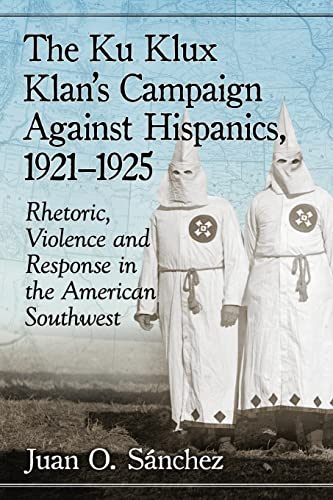The Ku Klux Klan's Campaign Against Hispanics, 1921-1925
Rhetoric, Violence and Response in the American Southwest
Juan O. Sánchez
BOOK REVIEW

The haunting echoes of the past often reverberate with startling clarity, especially when it involves the dark legacies of hate and violence woven deeply into the fabric of American history. In The Ku Klux Klan's Campaign Against Hispanics, 1921-1925: Rhetoric, Violence and Response in the American Southwest, Juan O. Sánchez dares to peel back the layers of this unsettling history, illuminating a narrative that many prefer to forget. This book is not merely an account; it is a clarion call to confront the shadows of racism that still loom over our society today.
Set against the backdrop of the 1920s - a decade characterized by social upheaval and political reformation - Sánchez captures the insidious rise of the KKK's campaign against Hispanic communities in the American Southwest. It wasn't just about the Klan's infamous white supremacy; it was a calculated attack on cultural identity, a deliberate effort to erase the rich heritage of Latinos. His meticulous research unveils the rhetoric that fueled violence, presenting a disturbing tapestry woven with threads of fear, hatred, and unfounded suspicion.
This period bore witness to the Klan's twisted narrative-one that promoted itself as a savior of white America while systematically targeting those it deemed "other." Sánchez's compelling dissection of this rhetoric forces us to confront uncomfortable truths about both the past and the present. Within the pages, we feel the weight of bias and prejudice rise like a specter, clawing at the remnants of humanity that unfortunately persist in modern ideologies.
Readers often remark on the chilling effectiveness of Sánchez's arguments. One critic notes the gripping nature of his prose, which is "both eloquent and terrifying in its accuracy." Reviewers highlight how he manages to balance scholarly rigor with storytelling, creating a visceral experience that resonates long after the final page is turned. It's an emotional ride that can provoke righteous anger and profound sorrow, as it invites us to explore not just historical facts, but the implications these events have on contemporary society.
Accessing archival documents, personal testimonies, and an array of secondary sources, Sánchez crafts a narrative that is as enlightening as it is disturbing. His analysis shines a light on the responses of affected communities, showcasing resilience in the face of brutality. It serves as a reminder that amidst the tide of hatred, there exists an indomitable spirit of resistance that must not be overlooked. The voices of those who fought against oppression become not just a footnote, but a powerful counter-narrative that underscores the importance of solidarity and community in battling hate.
The urgency of Sánchez's work cannot be overstated, especially in an era where extremist sentiments once again threaten to ignite societal divides. His call for acknowledgment and reflection serves as both a warning and a beacon of hope. "To forget is to empower," he seems to whisper through his pages, urging us to recognize the cyclical nature of history to prevent it from repeating itself.
As the discussions surrounding race and identity continue to evolve, this book becomes a crucial reference point. It invites readers to not only engage with the past but also to examine their own beliefs and prejudices. Critics of Sánchez have occasionally argued that the work leans too heavily into a singular narrative of victimhood; however, this sentiment neglects the profound importance of these stories as vital components in understanding the broader context of American identity.
Ultimately, The Ku Klux Klan's Campaign Against Hispanics, while steeped in specific historical events, resonates with anyone facing the threats posed by hate in all its forms. Every reader, regardless of background, is summoned to reflect on the implications of this history today. The lessons contained within these pages are not archaic relics; they are alive, demanding attention, discourse, and action. As you navigate your way through Sánchez's poignant insights, you may find yourself grappling with questions that challenge not just history, but the very fabric of contemporary society.
In conclusion, as you consider the narratives that shape our world, there's a pressing need to excavate our past with the intent of fostering understanding and compassion. Like Sánchez's work, it's an ongoing battle we must not shy away from. Now is the time to face the reality of our history-not just to learn but to grow, to change, and to fortify our commitment to a more inclusive future. 🌍✊️
📖 The Ku Klux Klan's Campaign Against Hispanics, 1921-1925: Rhetoric, Violence and Response in the American Southwest
✍ by Juan O. Sánchez
🧾 282 pages
2018
#klux #klans #campaign #against #hispanics #1921 #1925 #rhetoric #violence #response #american #southwest #juan #sanchez #JuanOSanchez